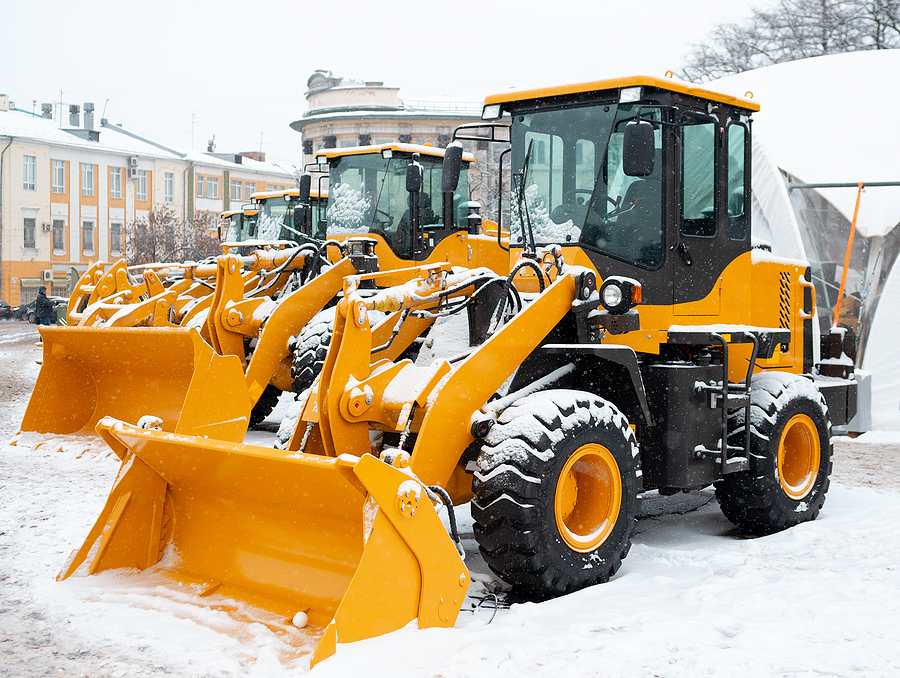Winter doesn’t always put projects on hold just because of cold weather. If you have a major construction, renovation, or landscaping project during this time of year, it’s important to have the right equipment – and to treat it right – to get the job done.
Equipment and large work vehicles are not fond of the cold. Batteries and engines are less efficient. Parts can freeze solid overnight, and snow melting into the control panels is always bad news. Whether you are renting equipment over a weekend or for a project that will last several weeks, even months, it’s critical to take good care of your equipment so that it performs to your standards and is returned in good condition.
Here at Vandalia Rental, we’ll make sure you have clean filters and fresh oil; every piece of equipment is well-maintained when your work begins. During your projects, however, it’s up to you to maintain good cold-weather care for all your equipment. This ensures the safety of not only the equipment itself, but also your team using heavy equipment for winter projects.
Cover Equipment When Not in Use
We know that equipment is not in use 100% of the time. Your team has to eat lunch and go home daily and during that time, equipment is not being used. Any time your winter-project equipment is not currently humming along with a human at the controls, try to make sure it is covered or sheltered from the weather. This reduces the negative effects of cold and ensures that snow and ice do not build up on (or inside) the equipment you plan to use on returning to the work site.
Make Use of Block Engine Heaters When Starting Up
Engines and equipment batteries do not like to start cold in the morning. Just like your personal vehicle that needs a warm-up in the garage before you can head to work; your large vehicles and equipment may also need a warm-up.
Use an engine block heater to warm your engine before trying to start any equipment that has been stored in a cold parking lot, shed, or garage overnight, or for a few hours during a sub-freezing day.
Use Fuel Heaters for Diesel Equipment
Many large pieces of equipment and work vehicles require diesel instead of normal gasoline. Diesel is also a little finicky in the winter. We can help you fill up and source winterized diesel for your equipment; but it can also be helpful to use a fuel heater to help your diesel equipment get started after sitting in the cold.
Test Batteries Before Each Use
Batteries also don’t perform as well in cold weather. It’s important to only use equipment in winter that is capable of cold weather cranking without amperage loss. Pre-warm your batteries and test all batteries before firing up a device; this helps make sure you have power and the battery is in good condition. If necessary, keep warmed backup batteries and swap out if any of your batteries become too cold or unresponsive.
Always Park Heavy Equipment on Pavement, Not on Snow
During a snowy winter, try to keep equipment on pavement and known solid surfaces. Even if you traverse snowy landscapes on vehicle treads during work hours, never park your vehicle on piled snow for an extended period or overnight. Parking on snow can cause equipment to sink and become stuck in re-frozen snow; it puts many pieces at risk of moisture damage.
Store Indoors or Under Shelter
When possible, store all equipment indoors, under a shelter, or under a tarp during winter projects. Parking your equipment vehicles inside a garage or under a shelter roof can significantly improve their long-term performance and avoid any weather-related damage. Even tarps and covers can protect your equipment from hail damage and moisture damage while unattended in cold weather.
Keep Control Panels and Batteries Dry
Be careful about ice and snow on your control boards. Snow is harmless in flakes, but it can melt and moisture will permeate the electrical systems of your equipment. Re-frozen moisture is even worse for the inside of equipment. Keep your control panels covered and keep batteries dry no matter what the weather gets up to.
Lubricate Parts According to Cold Weather Instructions
Last but certainly not least is lubrication. When Vandalia delivers your equipment, each piece and vehicle will be properly lubricated for the season. However, extended projects are often benefitted by applying the appropriate winter lubrication to all equipment that is used continuously in cold weather conditions. This will reduce rust, improve performance, and ensure your equipment stays in good condition for the entire duration of your project.
Gearing up for a winter project? Contact us today for the equipment rental you need and helpful maintenance tips to get the most out of your rented equipment this winter.


